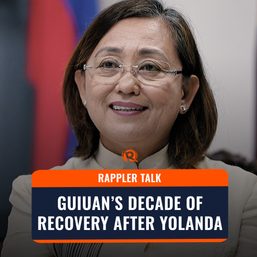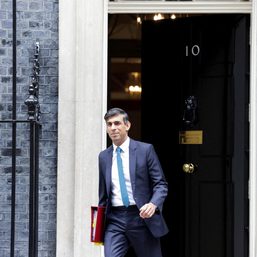SUMMARY
This is AI generated summarization, which may have errors. For context, always refer to the full article.
![[Vantage Point] Risky recovery](https://www.rappler.com/tachyon/2023/03/vantage-point-risky-recovery-March-24-2023.jpg)
In December 2021, Typhoon Odette (known internationally as Rai) struck the Philippines, bringing torrential rains, violent winds, and horrific landslides in the provinces of Surigao del Norte and Dinagat Islands in Mindanao, five provinces of Visayas, and the island of Palawan in Luzon. To our kababayans there, December was unforgettable, not for the joyful yuletide memories, but for the devastation wrought by Odette.
Even as the entire country is still in a tough recovery phase from the COVID-19 pandemic, these typhoon victims also became vulnerable to physical trauma, as well as mental problems such as stress disorders, depression, and general anxiety. In times of natural disasters, such as Odette, businesses and residences with catastrophe insurance were deemed truly fortunate for the financial protection their policies offer them. Unfortunately, not all such “protection” would prove enough to help them recover.
One such victim, Plantation Bay, a five-star resort in Mactan Island, Cebu, suffered over half a billion pesos worth of damage. Resort owner Plantation Bay Holdings Corporation (PBHC) has reportedly filed 12 counts of estafa (or swindling through either abuse of confidence or by deceit) against its insurance provider and other purported cohorts for failing to pay the resort’s insurance claim worth P540 million.
According to the complaint which was recently filed before the Office of the Makati City Prosecutor, PBHC’s insurance provider, official broker, and US-based insurance adjuster allegedly conspired to dodge the payment of the full claim.
After paying its annual premiums religiously, PBHC finally made a P540-million claim on their policy in March 2022. After ignoring the claim for five whole months, the insurer came up with a counteroffer of only P174 million, even though the coverage amount was reportedly up to P800 million. PBHC felt that the drastically reduced amount was a case of adding (severe) insult to injury.
Further aggravating the situation for the insurer and its fellow respondents is the fact that the Insurance Commission reportedly ordered that all insurance claims be filed immediately and, as per the rules of the Insurance Code, be paid within 90 days of properly filing the claim. To date (almost 400 days after filing), PBHC has only been paid P80 million.
With the case currently in the courts, there really is not much else that can be said in terms of commentary. However, one thing we can see from this situation is the important role of the insurance industry in post-disaster and post-pandemic recovery. It highlights how insurance is necessary so that individuals and businesses are protected when something catastrophic happens. It also underscores how insurance is wholly based on trust. It is crucial therefore to partner with an insurance provider that will honor their commitments to you in your time of need.
Now that the Philippines is in a “recovery phase” after reeling from the economic effects of the pandemic, news like this will make it more difficult to convince local and foreign investors to take the proverbial entrepreneurial plunge. The stigma of having an unreliable and uncertain insurance landscape will certainly affect the risk vs reward assessments of potential investors.
Without trust, customers lose confidence in what they are paying for and will not be forthcoming with accurate information. For both customer and insurance provider, the damage may be huge.
The value of insurance manifests only at the time a claim is made. Insurers therefore must build trust by managing customer expectations during the claims process.
We can only hope that the outcome of the PBHC’s case will be fair to all parties, particularly to the industry at large. This is an important opportunity for the Insurance Commission to prove to potential investors that they have the interest of the insured in mind. – Rappler.com
Val A. Villanueva is a veteran business journalist. He was a former business editor of the Philippine Star and the Gokongwei-owned Manila Times. For comments, suggestions email him at mvala.v@gmail.com.
Add a comment
How does this make you feel?


![[Under 3 Minutes] Kumusta na ang Yolanda housing projects?](https://www.rappler.com/tachyon/2023/11/title-card-ls-3.jpg?resize=257%2C257&crop_strategy=attention)







![[Rappler’s Best] US does propaganda? Of course.](https://www.rappler.com/tachyon/2024/06/US-does-propaganda-Of-course-june-17-2024.jpg?resize=257%2C257&crop=236px%2C0px%2C720px%2C720px)




There are no comments yet. Add your comment to start the conversation.